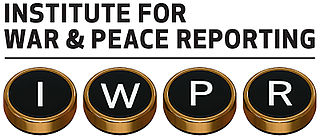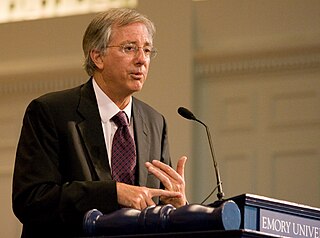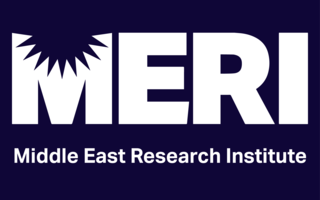Related Research Articles

The Institute for War & Peace Reporting (IWPR) is an independent nonprofit organization that trains and provide publishing opportunities for professional and citizen journalists. IWPR is registered in the UK as a charity ; the US under IRS Section 501(c)(3) and NL as a charitable foundation.

The United States Institute of Peace (USIP) is an American federal institution tasked with promoting conflict resolution and prevention worldwide. It provides research, analysis, and training to individuals in diplomacy, mediation, and other peace-building measures.

Gareth John Evans, is an Australian politician, international policymaker, academic, and barrister. He represented the Labor Party in the Senate and House of Representatives from 1978 to 1999, serving as a Cabinet Minister in the Hawke and Keating governments from 1983 to 1996 as Attorney-General, Minister for Resources and Energy, Minister for Transport and Communications and most prominently, from 1988 to 1996, as Minister for Foreign Affairs. He was Leader of the Government in the Senate from 1993 to 1996, Deputy Leader of the Opposition from 1996 to 1998, and remains one of the two longest-serving federal Cabinet Ministers in Labor Party history.

Fouad A. Ajami was a Lebanese-born American professor and writer on Middle Eastern issues. He was a senior fellow at Stanford University's Hoover Institution.

Stephen John Hadley is an American attorney and senior government official who served as the 20th United States National Security Advisor from 2005 to 2009. He served under President George W. Bush during the second term of his administration. Hadley was Deputy National Security Advisor during Bush's first term.

The identification of the causes of World War I remains a debated issue. World War I began in the Balkans on July 28, 1914, and hostilities ended on November 11, 1918, leaving 17 million dead and 25 million wounded. Moreover, the Russian Civil War can in many ways be considered a continuation of World War I, as can various other conflicts in the direct aftermath of 1918.

Dennis B. Ross is an American diplomat and author. He served as the Director of Policy Planning in the State Department under President George H. W. Bush, the special Middle East coordinator under President Bill Clinton, and was a special adviser for the Persian Gulf and Southwest Asia to former Secretary of State Hillary Clinton. Ross is currently a fellow at The Washington Institute for Near East Policy, a pro-Israel think tank, and co-chairs the Jewish People Policy Institute's board of directors.

The Greater Middle East is a geopolitical term introduced in March 2004 in a paper published by the Carnegie Endowment for International Peace as part of the United States' preparatory work for the Group of Eight summit of June 2004. The paper presented a proposal for sweeping change in the way the West deals with the Middle East and North Africa. It also denotes a vaguely defined region encompassing the Arab world, along with Afghanistan, Iran, Turkey, and sometimes the Caucasus and Central Asia.

Meghan L. O'Sullivan is a former deputy national security adviser on Iraq and Afghanistan. She is Jeane Kirkpatrick Professor of the Practice of International Affairs at Harvard Kennedy School and a board member of the Belfer Center for Science and International Affairs at Kennedy School. She is a member of the board of directors of the Council on Foreign Relations, and Raytheon, and the North American chair of the Trilateral Commission.

Vali Reza Nasr is an Iranian-American academic and author, specializing in the Middle East and the Islamic world. He is Majid Khaddouri Professor of International Affairs and Middle East Studies at the Johns Hopkins School of Advanced International Studies (SAIS) in Washington, D.C. He served as the eighth dean of the school from 2012 to 2019. Nasr is also a Non-Resident Fellow in South Asia at Atlantic Council and is described by The Economist as "a leading world authority on Shia Islam".
Dual containment was an official US foreign policy aimed at containing Ba'athist Iraq and Revolutionary Iran. The term was first officially used in May 1993 by Martin Indyk at the Washington Institute for Near East Policy and officially announced on February 24, 1994 at a symposium of the Middle East Policy Council by Indyk, who was the senior director for Middle East Affairs of the National Security Council (NSC).
Helena Cobban is a British-American writer and researcher on international relations, with special interests in the Middle East, the international system, and transitional justice. She is a non-resident Senior fellow at the Washington DC–based Center for International Policy. She is the founder and CEO of the book-publishing company, Just World Books and the Executive President of the small educational non-profit organization, Just World Educational. Having contributed throughout her career to numerous media outlets and authored seven books, she resumed her writing career in 2019.
Janie L. Leatherman is an international relations scholar from the United States. She is a Professor of Politics and International Studies at Fairfield University. Her publications encompass conflict early warning and prevention, conflict transformation, and peace building, which work is cited in the development of the international principle and doctrine on the Responsibility to Protect. In addition, her scholarship has contributed to the normative understanding of peace building, and the exercise of discipline and punitive power in international affairs, including in the global political economy of sexual violence and armed conflict, and its gendered dimensions.

Daniel L. Byman is a researcher on terrorism, Counterterrorism and the Middle East. Dr. Byman is a Professor in Georgetown University's Walsh School of Foreign Service and Director of Georgetown's Security Studies Program He is a former Vice-Dean of the school.
Eric D. Patterson is an American political scientist whose work focuses on international relations, just war theory, and the intersection of religion and public policy. His advanced degrees are from the University of California, Santa Barbara and the University of Wales at Aberystwyth. He serves as President & CEO of the Victims of Communism Memorial Foundation in Washington, DC. He worked for five years as Executive Vice President and President at the Religious Freedom Institute in Washington, DC, and previously served as Dean and Professor of the Robertson School of Government at Regent University in Virginia Beach, VA. Before that he worked at Georgetown University's Berkley Center for Religion, Peace, and World Affairs in Washington, DC. His government experience includes service as an Air National Guard commander, the White House Fellowship, and time as a William C. Foster Fellow working at the U.S. State Department's Bureau of Political-Military Affairs. His academic articles have appeared in Public Integrity, Journal of Military Ethics, Survival, International Studies Perspectives, International Journal of Religious Freedom, Democracy and Society, Journal of Human Security, International Journal of Applied Philosophy, International Politics, Foreign Policy Journal, International Journal of Intelligence and CounterIntelligence, Journal of Political Science, Journal for the Scientific Study of Religion, and Security Studies.

Michael Patrick Mulroy is the former United States Deputy Assistant Secretary of Defense (DASD) for the Middle East, serving under Secretary James N. Mattis and Secretary Mark T. Esper. He was responsible for representing the United States Department of Defense (DoD) for defense policy and for Middle East policy in the interagency. He is also a retired CIA Paramilitary Operations Officer and a United States Marine.

The Middle East Research Institute (MERI) is an academic policy-research institute and think tank based in Erbil in the Kurdistan Region of Iraq. MERI carries out fundamental research in areas of peace, human rights, governance, security and economy. Founded in 2014, the organisation has grown rapidly and now occupies an important niche in the field of policy research in the Middle East. MERI has been ranked by Think Tanks and Civil Societies Program of University of Pennsylvania as Iraq's leading policy research organisation for the past three years in a run and No. 34 in the Middle East and North Africa.
Dov Waxman is an author, academic and commentator. He is the Rosalinde and Arthur Gilbert Foundation Professor of Israel Studies at the University of California, Los Angeles (UCLA), and the director of the UCLA Younes and Soraya Nazarian Center for Israel Studies.

Carla Ravi Koppell is an American academic who serves as interim Vice Dean for Diversity, Equity, and Inclusion at the Edmund A. Walsh School of Foreign Service at Georgetown University. As part of her work she collaborates with the Volcker Alliance to spearhead the University Leadership Council on Diversity and Inclusion in International Affairs. In that role, she works with deans of graduate schools of public policy and international affairs to incorporate attention to diversity and inclusion in their curricula and programs.

Aaron (Aharon) S. Klieman was an American-born Israeli historian of international relations who developed the field of international affairs in Israel and abroad. Klieman researched a wide variety of fields in political science including history, arms sales, and geopolitics. He was the Dr. Nahum Goldmann Chair in Diplomacy and lecturer on international relations in the Department of Political Science at Tel-Aviv University, and was the founding director of the Abba Eban Graduate Program in Diplomatic Studies. A native of Chicago, Illinois, his PhD is from The Johns Hopkins University School of Advanced International Studies, with an M.A. from the School of International Affairs at Columbia University in Middle Eastern studies.
References
- ↑ "Daniel Serwer". Middle East Institute. Retrieved 2020-10-09.
- ↑ Serwer, Daniel Paul, 1945- (30 November 2013). Righting the balance : how you can help protect America. Lincoln. ISBN 978-1-61234-667-0. OCLC 863158340.
{{cite book}}: CS1 maint: location missing publisher (link) CS1 maint: multiple names: authors list (link) CS1 maint: numeric names: authors list (link) - ↑ "Escaping the shadow of the past". www.peacefare.net. Archived from the original on 2010-12-02. Retrieved 2020-10-09.
- ↑ "Adam Serwer's page in The Atlantic". www.theatlantic.com. Retrieved 2021-01-13.